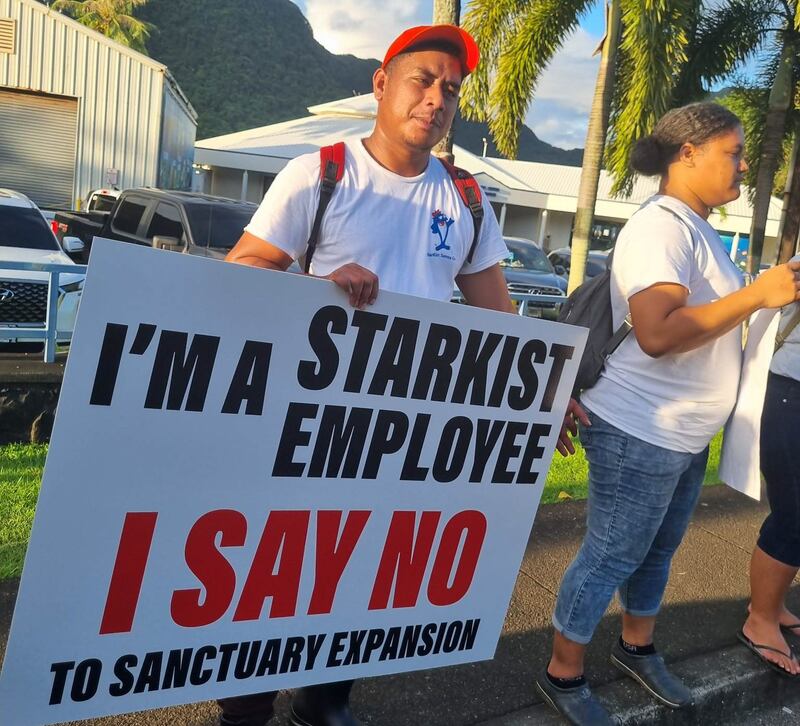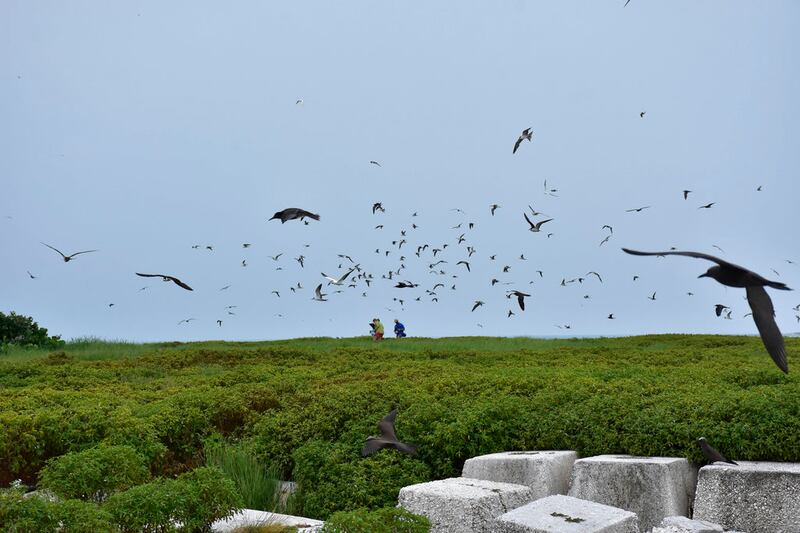A public hearing in American Samoa about U.S. plans to expand a Pacific marine sanctuary has failed to assuage fears of tuna cannery job losses and further economic decline in the territory, according to workers, business owners and political leaders.
After a decade of lobbying by the Hawaii-based Pacific Remote Islands Coalition, the U.S. government earlier this year said it could double the size of the protected area around uninhabited U.S. islands in the Pacific Ocean, making more ocean area off-limits to fishing fleets.
But the proposal has been greeted with dismay in American Samoa, where residents fear a heavy blow to the economically crucial tuna industry. Dozens of placard-wielding employees of the StarKist cannery in American Samoa protested outside a recent hearing held in Pago Pago by the U.S. National Oceanic and Atmospheric Administration, which oversees protected marine and coastal areas.
“I have seven children between the ages of two and 17, they are all in school, and I have been supporting my family working for StarKist Samoa,” Tanielu Malae, the sole breadwinner for his family, said at the May 25 hearing. “Do the people in Hawaii that made this proposal know what it is like for people like us that did not have proper education if we lose our jobs.”

American Samoa’s Lieutenant Governor, Talauega Eleasalo Ale, who said he was at the hearing as a resident rather than representing the territory’s government, made an emotional appeal to “brothers and sisters” in Hawaii.
“What you are doing is unnecessary and it is painful and mean because you are not gaining anything extra by this proposition, but you are hurting us and cannery workers in this room that live off this land and rely on the fish that is coming from those islands,” he said. “If you really believe that we are your brothers and sisters you have to let this go.”
American Samoa’s governor and other politicians have voiced their opposition to the sanctuary expansion and criticized lack of consultation with the territory.
‘Fight against biodiversity loss’
The total area of the expanded sanctuary would be 2 million square kilometers (770,000 square miles), larger than the Gulf of Mexico, compared with about 1.3 million square kilometers (495,000 square miles) now.
It encompasses waters around several islands, atolls and reefs that the oceanic administration says are “home to some of the most diverse and remarkable tropical marine life on the planet.”
The tropical waters are also ideal for skipjack tuna which travel the equator in search of schools of small fish to feed on.
Tuna fishing provides about 5,000 jobs in American Samoa – where the South Korean-owned StarKist tuna cannery is the territory’s largest business – but the industry has been in decline. The American Samoan islands, located to the south of the marine sanctuary, are home to less than 50,000 people after suffering a shrinking population for at least the past decade.
“There are roughly 5,000 indirect and direct jobs that will be impacted,” said Taotasi Archie Soliai, Director of Marine Wildlife Resources in the territory.
“Think about that number,” he said at last week’s hearing. “These are underserved marginalized stricken disenfranchised minorities and indigenous communities that will continue to suffer because of these types of Federal policies driven by people who do not care.”

Advocates of marine sanctuaries say they are crucial for the survival of endangered species and the health of the oceans.
The Pacific Remote Islands Coalition, which includes activists, scientists and nonprofit organizations, said that expanding the Pacific marine sanctuary will “meaningfully protect” the interconnected land, reef, sea and deep ocean environments.
The coalition also wants to rename the sanctuary “through a culturally appropriate process that honors the cultural, historic, and ancestral significance of the region.”
“Nature is declining globally at rates unprecedented in human history. Intact natural ecosystems such as the Pacific remote islands are more resilient to the effects of climate change and can help in the fight against biodiversity loss,” the group said in its 250-page submission to the U.S. government.
Questionable benefits for tuna stocks
For tuna, which have large ranges, it’s unclear if protected areas can produce an increase in their numbers.
Research published in January in the journal Frontiers in Marine Science predicted “weak to non-existent” benefits for skipjack and bigeye tuna numbers from marine protected areas. The study’s modeling was based on Kiribati’s Phoenix Islands Protected Area and hypothetical sanctuaries making up about one third of the western and central Pacific Ocean.
Businessman Vince Haleck, who owns three long-line fishing vessels, told the Pago Pago hearing that an expanded marine sanctuary is meaningless without proper policing of American Samoa's own waters to prevent unregulated fishing by China-flagged vessels.
“Literally thousands of vessels, my boats, our boats see them all the time, catching our fish and selling it to us,” he said.
Despite talk of U.S. Coast Guard assistance, “nothing has happened,” he said. “The Chinese will continue to fish in our waters, and we can’t seem to have the political will from Washington to be able to address this issue.”
Haleck said a possible consequence of the expanded sanctuary is that purse seiner vessels, which trail vast nets to scoop fish from the ocean, will find it more economic to take their catch to Mexico than American Samoa.
The National Oceanic and Atmospheric Administration also held public hearings last month in Hawaii, Guam and the Northern Mariana Islands.
